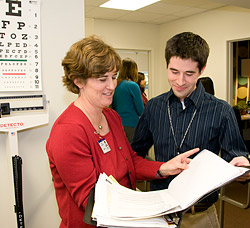In the last 10 years, the St. Louis area has seen an alarming increase in new diagnoses of HIV and sexually transmitted infections among 13-24 year-olds. Between 1997-2007, more than 50 new diagnoses of HIV were made each year among adolescents and young adults, who are often disconnected from the health-care system or support services. Nationwide, St. Louis has among the highest rates of sexually transmitted diseases in this age group.

To head off this trend, Project ARK (AIDS/HIV Resources and Knowledge) and the Adolescent Center in the Department of Pediatrics in collaboration with community partners have launched the SPOT (Supporting Positive Opportunities with Teens) aimed specifically at the 13-24 year age group. The first of its kind in the St. Louis area, the SPOT is a one-stop, drop-in center for youth that will provide testing for HIV and sexually transmitted diseases, health care and counseling, social support, prevention and case management services at no cost. School of Medicine physicians and staff from a variety of disciplines will provide services.
“This is a huge public-health epidemic that we have to address,” said Katie Plax, M.D., director of the Adolescent Center, assistant professor of pediatrics and medical director for the SPOT. “Leaving it unchecked means the rates of sexually transmitted diseases and HIV will continue to rise. With cuts to Medicaid and the economy getting worse, it’s not surprising that this epidemic is getting worse and young people have fewer places to turn.”
The SPOT opened in mid-September at 4169 Laclede Ave. The colorful and modern drop-in center has a living room with cozy furniture and computers, offices for physicians and staff, exam rooms, a kitchenette, showers, lockers and laundry facilities.
“We are looking for the disenfranchised youth who are disconnected because of barriers or perceived barriers to the health-care system,” Donica said. “We will try to address these barriers and connect them into the system to prevent future infections. If a patient comes in with an STD or symptoms, we don’t want anything to prevent care.”

The SPOT will offer rapid HIV tests, which provide results in about 20 minutes, and be open accessible hours for testing and other services.
“We are excited to get the message to teens that this is a safe space to received medical care with no strings attached,” said Regina Whittington, program director of the SPOT. “We hope to provide a place that will establish regular health care for these teens as they transition into young adults.”
A youth advisory group was instrumental in the program’s design, Donica said.
“The group helped with the design of the space and told us they wanted a homey feel,” she said. “Their top requests were to obtain testing for HIV or STDs and have mental health and counseling services available.”
Among the University disciplines contributing to SPOT are the departments of pediatric and adult infectious diseases; the Adolescent Center; Jeffrey Peipert, M.D., the Robert J. Terry Professor of Obstetrics and Gynecology and principal investigator of the Contraceptive Choice Project; and Denise Willers, M.D., assistant professor of obstetrics and gynecology. Supporting the project are the Barnes-Jewish Hospital and St. Louis Children’s Hospital foundations, BJC Health Care, the City of St. Louis and the Missouri Foundation for Health.
The SPOT will rely on a variety of community partnerships for clients and services, including Youth in Need, Epworth Children & Family Services, Planned Parenthood/St. Louis Region, St. Louis Area National Council on Alcoholism and Drug Abuse, St. Louis Agency on Training and Employment and local health departments.
“This is really a community partnership, with the University taking a role in public health,” Donica said.
Washington University School of Medicine’s 2,100 employed and volunteer faculty physicians also are the medical staff of Barnes-Jewish and St. Louis Children’s hospitals. The School of Medicine is one of the leading medical research, teaching and patient care institutions in the nation, currently ranked third in the nation by U.S. News & World Report. Through its affiliations with Barnes-Jewish and St. Louis Children’s hospitals, the School of Medicine is linked to BJC HealthCare.